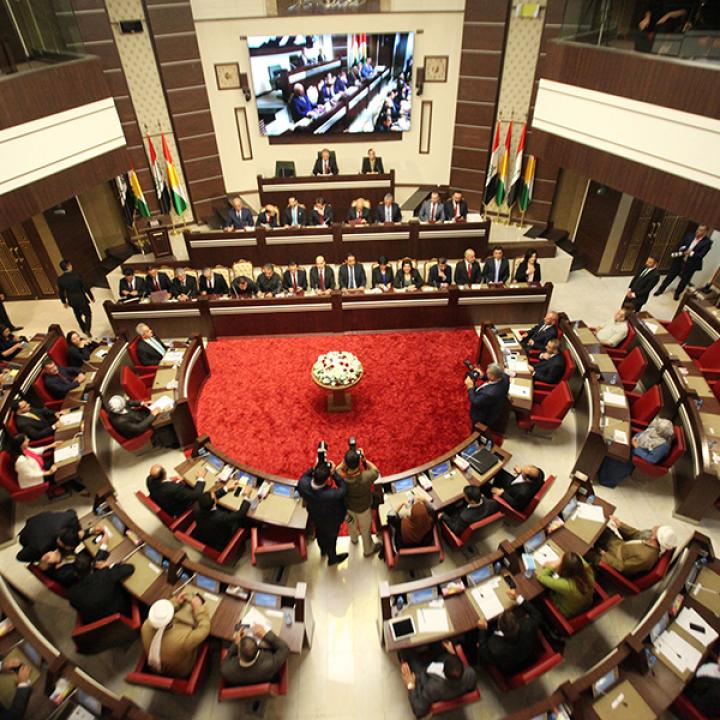
- Policy Analysis
- Policy Alert
Iraqi Kurdistan’s New Government

After months of delay, the new cabinet must get up to speed quickly in order to put KRG-federal relations on solid legal ground, curtail Iranian influence, and unify the Peshmerga.
On July 10, the Kurdistan Regional Government’s parliament voted in a new cabinet led by Prime Minister Masrour Barzani, eldest son of former president Masoud Barzani. Masrour succeeds his cousin Nechirvan Barzani, the long-serving KRG premier who was sworn in last month as president. The cabinet now comprises twenty-one ministers, including three without portfolio. Two seats were earmarked for Christian and Turkmen representatives; three women won seats as well, the largest number to date.
NEW FACES, LINGERING CHALLENGES
It took nine months to form the new cabinet following last September’s parliamentary elections. The delay was caused by deep divisions between and within the KRG’s main political parties. The Kurdistan Democratic Party, which won 45 of the parliament’s 111 seats, could not form a government without the Patriotic Union of Kurdistan (21 seats); the two factions have long vacillated between partnership and rivalry depending on political circumstances. The Gorran Party, the KRG’s largest opposition faction, came in third with 12 seats. Geographically, Sulaymaniyah province is a contested Gorran and PUK stronghold, while the KDP holds the reins in Erbil and Dahuk provinces. Before, during, and after the election campaign, the three parties took turns blaming each other for the ill-fated independence referendum of 2017, which cost the KRG dearly in political, economic, and territorial capital. Forming the new cabinet has seemingly given them some common ground for conciliation.
The PUK and Gorran have also suffered from internal fractures since the passing of their leaders in 2017 (Jalal Talabani and Nawshirwan Mustafa, respectively). The KDP enjoys greater unity thanks to its leader Masoud Barzani, who spearheaded the push to select Nechirvan as president and Masrour as prime minister, ushering in the transition to the family’s next generation of leaders.
Masrour has picked his priorities well so far. He has pledged that his government will focus on streamlining KRG relations with Baghdad over issues of revenue and territory while fighting corruption and improving governance and economic diversification at home. But he faces two key challenges.
The first lies in the partisan nature of his cabinet. After a politically fraught selection process, technocrats have generally been sidelined in favor of loyalists to various rival parties, which could delay or derail implementation of his agenda.
Second, all of Masrour’s past posts have been in the security sector, and he has never served on a cabinet. His previous post was chancellor of the Kurdistan Region Security Council, an important role in which he oversaw the KRG’s security apparatus and proved his strong military credentials. In that capacity, however, he was surrounded by confidantes and reported only to his father. Coming out into the public spotlight and leading a multiparty cabinet, most of whose members are first-timers, will be a different feat. The veteran guidance of Nechirvan and PUK deputy prime minister Qubad Talabani may help ease his transition.
Currently, however, Masrour is striking a tone of change over continuity, declaring in a July 10 tweet that his cabinet “marks a new era for Kurdistan.” This could indicate emerging competition between the two cousins. Missing from the cabinet is Ashti Hawrami, a Nechirvan confidante who has served as the powerful minister of natural resources. Also, the KRG website now has a new domain name and does not include links to previous cabinets. In light of such developments, the role that Barzani family dynamics will play in the transition has become a subject of much discussion in the Kurdish press and social media platforms.
RELATIONS WITH THE UNITED STATES
Washington supports a strong KRG within a unified Iraq. A number of steps would help facilitate this goal:
Improve KRG relations with Baghdad. To advance this already declared priority, Prime Minister Barzani would need to base relations between the federal and regional governments on solid legal and formal ground rather than short-lived political handshakes. Baghdad and Erbil have longstanding disputes over oil and gas management rights, budget and revenue sharing, and territory. These disagreements have fed instability and uncertainty, hindering the U.S. and Iraqi goal of fostering a sovereign, unified, and prosperous nation. KRG-federal relations have enjoyed a honeymoon of sorts in 2019, but the detente is precarious. Therefore, Washington would welcome any substantive commitments Barzani can make to a law-based, mutually beneficial, and fair relationship with Baghdad.
Keep Iran at arm’s length. The transactional nature of KRG-federal politics often invites Tehran to intervene as a mediator and enforcer. The risk of such influence has only increased since 2017, when Washington opposed the KRG independence referendum and U.S.-Kurdish relations took a sour turn. At the time, Masrour Barzani was the referendum’s chief lobbyist in Washington. Disappointed at the U.S. decision, the KDP mended its ties with Iran, among other steps. Going forward, the KRG would win favors in Washington if it pursues policies that contribute to Iraq’s independence from undue Iranian manipulation.
Unify the Peshmerga. Institutionalizing and uniting the Kurdish security forces would not only help safeguard Kurdistan from Islamic State remnants, but also bolster the KRG’s political standing at home and abroad. Much like what has happened in other parts of Iraq, unruly armed groups that report directly to political parties have dented the legitimacy of the KRG. With his security background and fresh perspective, Prime Minister Barzani has an opportunity to ensure that the Peshmerga are accountable to his government, not to the PUK and KDP. Peshmerga unity is a longstanding public demand, especially since divisions within the security forces exacerbated the losses that followed the referendum. Barzani has foreign support on this issue as well, given the mounting international pressure on Iraq to rein in militias.
Bilal Wahab is the Nathan and Esther K. Wagner Fellow at The Washington Institute.



